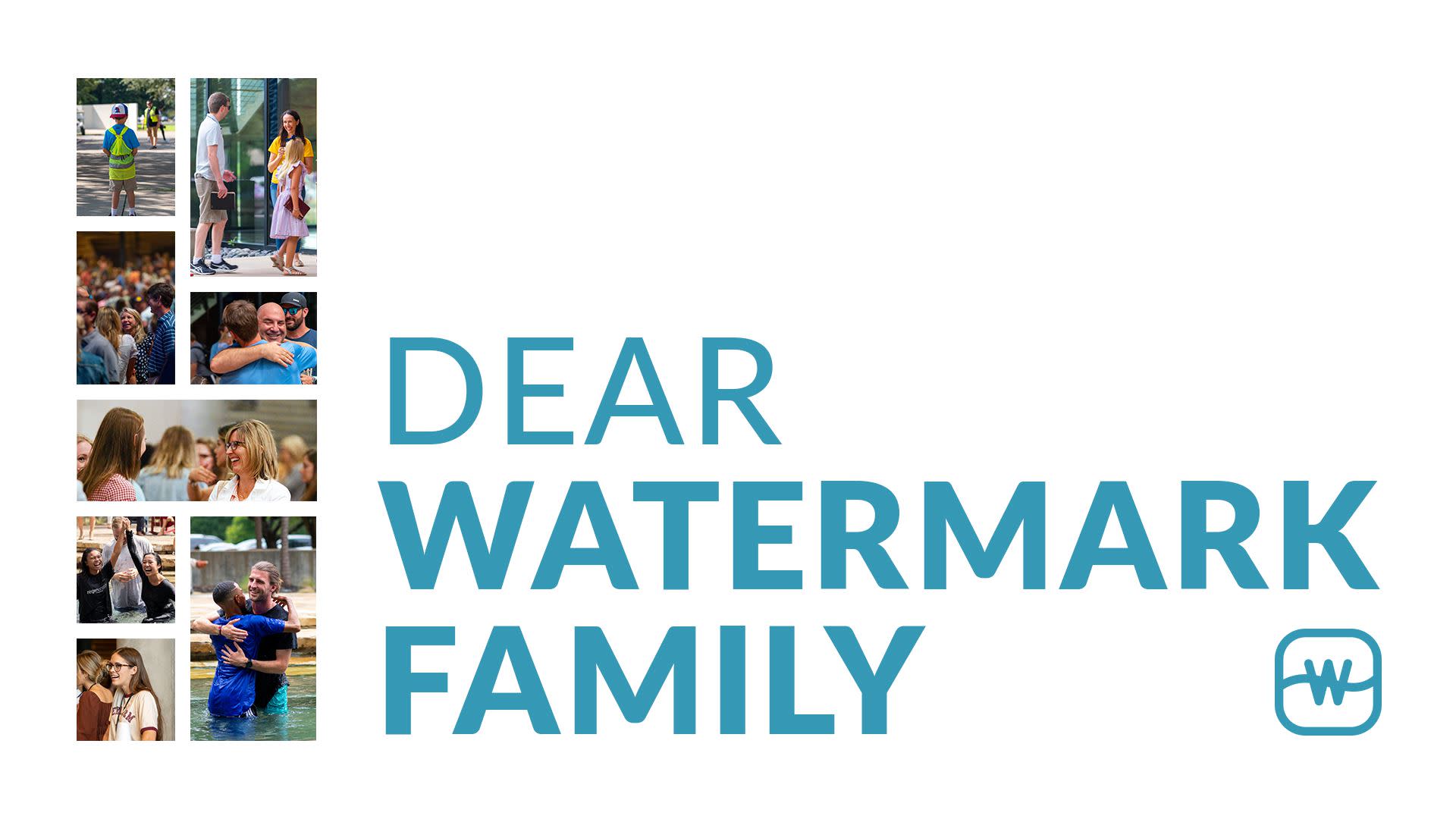Dear Watermark Family,
One can hardly check the news without immediately recognizing the headlines related to mental health. Here are just a few headlines from the past couple of months:
“As the Mental Health Crisis Grows, More Doors Open to Care” (New York Times, April 2023)
“Why Are Teens in Crisis? Here’s What the Evidence Says” (New York Times, May 2023)
“Surgeon General: We Have Become a Lonely Nation. It’s Time to Fix That” (New York Times, May 2023)
“What Does the Class of 2023 Want From Employers? Mental Health Benefits, For One Thing” (Wall Street Journal, April 2023)
“TikTok Feeds Teens A Diet of Darkness” (Wall Street Journal, May 2023)
Americans are not doing well—mentally, emotionally, or spiritually.
Sadly, many in the church are not faring much better. Compounding their problems, they are confronted by those critical of their condition and are fearful of being labeled. They may also battle their own internal feelings of guilt and shame for needing help. After all, the Christian faith is supposed to be one of joy and thanksgiving, right?
At Watermark, we support four avenues of care for those who are hurting.
- General care is offered to every member through our weekly worship service, 5:30 PM prayer service, equipping classes, etc.
- Community groups offer a place where we are known, loved, cared for, pursued, encouraged, and challenged to be more like Christ.
- Pastoral care ministries like re:generation, re|engage, GriefShare, DivorceCare, Courageous Hope, and the like offer more comprehensive support over an extended period of time. Please email care@watermark.org for additional help and prayer.
- Professional care through the help of trained counselors and therapists outside of our church’s ministries provides another avenue of help.
Our View of Counseling
We view counseling as an extension and provision of God’s grace to us in this fallen world (Philippians 4:19). Just as Jesus was trained as a carpenter and Paul was trained as a tentmaker (Mark 6:3, Acts 18:3), Christian counselors are trained to give biblical and psychological wisdom to help people identify and deal with the root causes and real issues of the mental, emotional, physical, relational, and spiritual challenges that we all face – this is God’s grace to us. We always need God’s people to help us, and sometimes professional counseling may be an additional avenue of help (Hebrews 10:24-25, Proverbs 27:17, Galatians 6:2). The doctrine of common grace teaches us to recognize that all good things come from the hand of our Heavenly Father (James 1:17). Professional counseling can be a means to help us in our goal of becoming more like Christ (2 Corinthians 3:18, Ephesians 4:15, Romans 12:2).
Heart of the Problem
Every human being is made in the image of God (imago dei; Genesis 1:27). God, in His perfect wisdom and intelligent design, has made us dynamic persons composed of both body and soul (i.e., spirit, mind, heart, will) (Matthew 10:28, 22:37). We can think, believe, feel, desire, decide, and act. However, we know that all of this is corrupted by sin (Genesis 3:1-24, Romans 3:23). We sin, others sin against us, and we experience the consequences of sin (Romans 6:23, Psalm 38:3). God, in His kindness, has provided us His Word, His Spirit, and His people to help us identify areas in our life we need to surrender to Him (Hebrews 4:12, John 14:16-17, Colossians 3:12-17).
Hope in Christ
We who are redeemed by Christ are united to Christ in His perfect life, suffering, death, resurrection, and ascension, and are indwelt by the Holy Spirit who works to conform us into the image of Christ and change how we respond to sin (2 Corinthians 5:17, 1 Corinthians 6:19-20, Romans 12:1-2). Scripture tells us that, in Christ, God has given us all we need for sanctification and has equipped us for life and godliness by His divine power (2 Peter 1:3). He uses the gifts of His Spirit (our “Counselor”; John 14:16, 14:26, 15:26), His Word, and His Church to help us in this process so that in His merciful providence we may “present everyone mature in Christ” (Colossians 1:28). Christ is committed to our growth and our flourishing (John 10:10, Colossians 3:10). But, as all of us know, we struggle, walk through seasons of difficulty, or feel stuck in our sin or suffering. In this case, counseling may be helpful.
Ask for Help
If you find yourself in need of help, stuck in a depressive state, or emotionally overwhelmed, would you please let someone in our church know? There is no shame in admitting you need help.
Where to start? Start by inviting your community group into the conversation and processing together what additional layers of care are available. Additional layers of care could include a spiritually mature friend, your community group shepherd and/or director, a Watermark staff member, one of Watermark’s pastoral care ministries, or a trusted Christian counselor. The goal is to find a resource who can provide biblical and trustworthy counsel about the challenges you are facing.
As always, ask those close to you to pray on your behalf. Why? Scripture assures us, “The Lord is near to the brokenhearted and saves the crushed in spirit.” (Psalm 34:18)
“Now to him who is able to keep you from stumbling and to present you blameless before the presence of his glory with great joy, to the only God, our Savior, through Jesus Christ our Lord, be glory, majesty, dominion, and authority, before all time and now and forever. Amen.” (Jude 24-25)
See you on Sunday,

Blake serves as Elder and Lead Pastor at Watermark Community Church.
Helpful Resources:
- Do You Need Counseling? 6 Questions to Help You Discern
- Instruments in the Redeemer’s Hands: People in Need of Change Helping People in Need of Change by Paul David Tripp
- Mental Health and Your Church: A Handbook for Biblical Care by Helen Thorne and Dr. Steve Midgley
